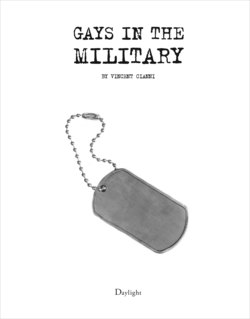Читать книгу Gays In The Military - Vincent Cianni - Страница 16
На сайте Литреса книга снята с продажи.
ОглавлениеJAMES HALLORAN, SAN ANTONIO, TX, 2012
SERGEANT E–5, U.S. ARMY, 1974–1978
Russian Linguist Voice Intercept Operator. Honorable discharge
I was born 1954 in Scranton, Pennsylvania. Roman Catholic identity was a large part of growing up. Neighborhoods were defined by which parish you belonged to, which was a surrogate for, “What is your ethnic heritage?” The highest political office (although it wasn’t elected) was the bishop, because that was the ultimate authority. The rules of the road were not voted on, they were handed down. And the value was on submission rather than on what we would call one’s individual process. That environment does a very good job of creating the appearance of living by those rules and believing those rules!
That was the ’70s, the era of great promise, the Age of Aquarius. The staff of life was beer! Smoking dope and popping speed was just how the world was. I went to university in Philadelphia. Being in the bigger city presented opportunities that did not happen at home and I remember having sex with somebody, though I don’t even remember exactly how it happened. Still no sense of declaring myself to myself as a gay man, and a common rationalization [I used] was, “OK, if I do this, I’m not going to get sent to Vietnam,” because my concept of the military–“the Army” we used generically to mean military service—was just part of the fabric of our life.
Perceptions of the Army had changed and the draft and war in Vietnam was about over. So that wasn’t going to happen to me if I went and talked to these guys. The attraction for me was quite practical, actually. I heard that the Army had these tests they can give you to tell you what to do. And my recruiter, Sergeant Doll, made it sound like finishing school. He painted it up wonderfully. And that was where it started. After boot camp, I was stationed for a year close to San Francisco. Language school seemed to have a good number of gay men. Many were training to work in intelligence or security fields and there was a generalized paranoia, much like in the civilian world. Lots of speculation and nothing said out loud, but recognition of a shared attribute and an emergence of social networks, but little if any sexual activity in the barracks.
One weekend our classmates went to Disneyland. Ben, like me, remained behind. He let me know he had a friend who lived in San Francisco, the epicenter of the emerging gay movement in the 1970s. Ben was urban Detroit to my suburban Scranton, black to my white, Protestant to my Catholic, musical to my tone deaf, savvy to my naive. We were young, buffed up from boot camp, and new on the gay block in the Castro. I had my first date with a guy, Rick, who lived there and we saw each other whenever I could get to San Francisco. It was the classic summer romance, Memorial Day to Labor Day.
After language school, I spent a couple months in West Texas at a small air force base where the commander was a not very secretly gay woman who earned respect from all. Despite being a security base, there was a fair bit of interaction with local civilians. My roommate in the barracks was also gay and we wound up dating two local civilians who were friends. Then duty assignment to D.C. meant immersion in another kind of fantasyland where things were not as apparent as in San Francisco.
Several years later, I wind up working with HIV-infected active-duty service members. People have no clue how important the Department of Defense was in HIV research. They link HIV with gay men but do not link gay men with military service, choosing not to inform officially unacknowledged active-duty gay men of the need to understand and address the threat of this disease within the uniformed services. The contributions of those brave men and women will likely go unsung in the history of the pandemic, just as the sacrifice of today’s service members gets yellow-ribbon bumper stickers or priority boarding at the airport, but not a lot of substantive understanding or ongoing support.
PAGE 51
